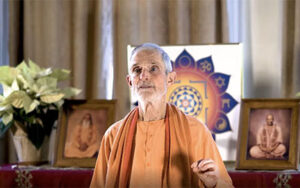
Photo by Thalia Ruiz via Unsplash.
We all probably struggle sometimes to make wise choices when deciding between taking care of others and taking care of ourselves. Many of us were raised with a strong work ethic that is reinforced by the “gotta get ahead” mentality of American culture, the value placed on sacrifice in Judeo-Christian faiths and the yogic teaching of selfless service.
Depending on the mental mood, we may find ourselves dwelling in unhealthy thoughts like, “Why should I have to do this? It’s not fair.” Or, the opposite thought, “I should do this. I’ll show them how good I am.” Both are based on judging and comparing ourselves to others, and are products of the ego—that persona we have unconsciously developed that compels us to look good in the eyes of others.
Of course, selfless service is a key element of Yoga in action and can be a tremendous source of joy and fulfillment. But it is meant to consider the well-being of everyone—including ourselves, not a form of self-denial. We can be so focused on promoting a successful image to sustain a reputation that we ignore our own needs. After periods of self-denial, we may feel resentful and needy, and react to that by making selfish choices.
Even when we do think about our needs in a healthy way, it may feel self-indulgent. Contrast that with a baby—an infant never hesitates for a second to express their needs, and quite convincingly. It is so important to remember that taking good care of ourselves is not in conflict with service. It makes it possible to serve with sustained energy, a focused mind and an open heart.
Sri Swami Satchidananda articulates this clearly in his book, The Golden Present: “You yourself should know how much you can give. You cannot give beyond your capacity. If you have done a lot of service that day, and if you are really tired, you should say no. Otherwise you are saying no to your own body or mind.”
We can all practice finding a balance between service and self-care so that we don’t go overboard by either giving too much or too little. And, of course, this discernment is aided by a daily meditative practice that builds enough clarity and awareness to catch ourselves falling into overdoing or being self-centered.
By observing our habitual tendencies we can learn to see when we need to show more compassion for ourselves or could reach out more often to lend a hand. Fortunately, we have countless opportunities to practice service and self-care every day, whether we are driving, listening to a friend, checking out at the grocery store, or working with others.
Clearly, the best motivation for serving others comes from experiencing for ourselves the feeling of compassion flowing through our hearts, and the natural sense of joy that arises from giving freely. Ultimately, we are all learning, one act of kindness at a time, that loving each other and loving ourselves are actually the same thing.
About the Author:
 Swami Ramananda is the Executive Director of Integral Yoga Institute in San Francisco, a certified Yoga therapist, and a founding board member of the Yoga Alliance. He leads beginner, intermediate and advanced-level Yoga teacher training programs in San Francisco and teaches throughout the world. Having dedicated his life to teaching Yoga for nearly 50 years, Swami Ramananda is highly-respected senior teacher in the Integral Yoga tradition in Yoga communities worldwide. Swami Ramananda co-developed the Stress Management Teacher Training program with Swami Vidyananda, has trained many teachers to bring Yoga into corporate, hospital and medical settings, and has taught mind/body wellness programs throughout the US and abroad. He is also a co-founder of The Spiritual Action Initiative (SAI) which brings together individuals committed to working for social justice for all beings and for the care and healing of our natural world.
Swami Ramananda is the Executive Director of Integral Yoga Institute in San Francisco, a certified Yoga therapist, and a founding board member of the Yoga Alliance. He leads beginner, intermediate and advanced-level Yoga teacher training programs in San Francisco and teaches throughout the world. Having dedicated his life to teaching Yoga for nearly 50 years, Swami Ramananda is highly-respected senior teacher in the Integral Yoga tradition in Yoga communities worldwide. Swami Ramananda co-developed the Stress Management Teacher Training program with Swami Vidyananda, has trained many teachers to bring Yoga into corporate, hospital and medical settings, and has taught mind/body wellness programs throughout the US and abroad. He is also a co-founder of The Spiritual Action Initiative (SAI) which brings together individuals committed to working for social justice for all beings and for the care and healing of our natural world.

